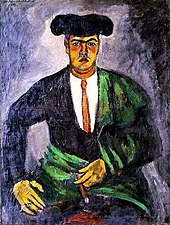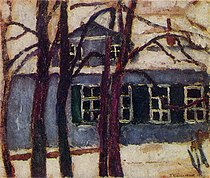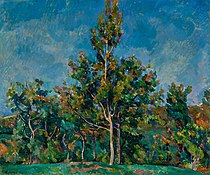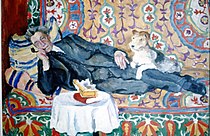| Revision as of 17:33, 27 April 2024 edit2a02:a468:71c7:1:44f3:6a20:a7b6:1a7e (talk) →Early life← Previous edit | Latest revision as of 17:32, 16 November 2024 edit undoFederhalter (talk | contribs)Extended confirmed users2,309 editsm Corrected spelling. | ||
| (3 intermediate revisions by 3 users not shown) | |||
| Line 16: | Line 16: | ||
| }} | }} | ||
| '''Pyotr Petrovich Konchalovsky''' (''also ]'' '''Petr'''; {{ |
'''Pyotr Petrovich Konchalovsky''' (''also ]'' '''Petr'''; {{langx|ru|Пётр Петрович Кончаловский}}; 21 February 1876 – 2 February 1956) was a Ukrainian and Soviet ], a member of the ] group. | ||
| ==Biography== | ==Biography== | ||
| === Early life === | === Early life === | ||
| Pyotr Konchalovsky was born in the village of ], ], ]Russian Empire on 21 February 1876. His father was a translator and art publisher, with connections to many of the artists active in Russia during the late 19th century.<ref name=":0">{{Cite journal |last=Sokolov |first=Kirill |date=1978 |title=P. P. Konchalovsky (1876-1956): On His Methods as a Painter of Pictures |url=https://www.jstor.org/stable/1573962 |journal=Leonardo |volume=11 |issue=4 |pages=321–325 |jstor=1573962 |issn=0024-094X}}</ref> In 1889, the Konchalovskys moved to Moscow and their house became a part of the Moscow art scene of the 1890s. Their house was often visited by ], ], ]. | Pyotr Konchalovsky was born in the village of ], ], ] ,Russian Empire on 21 February 1876. His father was a translator and art publisher, with connections to many of the artists active in Russia during the late 19th century.<ref name=":0">{{Cite journal |last=Sokolov |first=Kirill |date=1978 |title=P. P. Konchalovsky (1876-1956): On His Methods as a Painter of Pictures |url=https://www.jstor.org/stable/1573962 |journal=Leonardo |volume=11 |issue=4 |pages=321–325 |jstor=1573962 |issn=0024-094X}}</ref> In 1889, the Konchalovskys moved to Moscow and their house became a part of the Moscow art scene of the 1890s. Their house was often visited by ], ], ]. | ||
| During his ] years Konchalovsky attended classes of ]. In 1896-1898 he traveled to Paris and studied at the ]. In 1899, he returned to Russia and entered the ] in ], graduating in 1907. At the academy, he studied under Savinsky, Zaleman and Kovalevsky. | During his ] years Konchalovsky attended classes of ]. In 1896-1898 he traveled to Paris and studied at the ]. In 1899, he returned to Russia and entered the ] in ], graduating in 1907. At the academy, he studied under Savinsky, Zaleman and Kovalevsky. | ||
Latest revision as of 17:32, 16 November 2024
Russian painter In this name that follows Eastern Slavic naming customs, the patronymic is Petrovich and the family name is Konchalovsky.| Pyotr Konchalovsky | |
|---|---|
 Self portrait, 1912 (age 38) Self portrait, 1912 (age 38) | |
| Born | Pyotr Petrovich Konchalovsky (1876-02-21)21 February 1876 Sloviansk, Izyumsky Uyezd, Kharkov Governorate, Russian Empire |
| Died | 2 February 1956(1956-02-02) (aged 79) Moscow, Soviet Union |
| Nationality | Russian |
Pyotr Petrovich Konchalovsky (also trans. Petr; Russian: Пётр Петрович Кончаловский; 21 February 1876 – 2 February 1956) was a Ukrainian and Soviet painter, a member of the Knave of Diamonds group.
Biography
Early life
Pyotr Konchalovsky was born in the village of Slavianka, Izyumsky Uyezd, Kharkov Governorate ,Russian Empire on 21 February 1876. His father was a translator and art publisher, with connections to many of the artists active in Russia during the late 19th century. In 1889, the Konchalovskys moved to Moscow and their house became a part of the Moscow art scene of the 1890s. Their house was often visited by Valentin Serov, Mikhail Vrubel, Vasily Surikov.
During his gymnasium years Konchalovsky attended classes of Moscow School of Painting, Sculpture and Architecture. In 1896-1898 he traveled to Paris and studied at the Académie Julian. In 1899, he returned to Russia and entered the Imperial Academy of Arts in Saint Petersburg, graduating in 1907. At the academy, he studied under Savinsky, Zaleman and Kovalevsky.
Career
Breakout days in the Moskow avant-guard

His public debut was at the Salon des Indépendants exhibition in Paris, 1908, but Konchalovsky soon returned to Moscow, bringing with him new ideas (elements of his work from this period have been identified as "Fauvist"), as well as his more respectable Salon training.
By 1909, he was exhibiting frequently, participating in the Golden Fleece, Fraternity, Mir Iskusstva, and New Society of Artists. He was a founding member of the society Knave of Diamonds in 1909, a rebellious, avant-guard group seeking to synthesize the modern art breakthroughs of French and German styles with Russian primitivism. Where Western European looked to primitive African sculptures for artistic refreshment and inspiration, these Russian painters imagined they could turn to "indigenous" Russian works. Konchalovsky was elected as the group's chairman in 1911.
Post WWI advancements
After serving in the Russian army 1914–1916, Konchalovsky returned to his art with moderated intentions. Beginning in 1918 he taught art. In 1922, he had his first solo exhibition at the Tretyakov Gallery.
During that period, he mostly drew still lifes and landscapes. His paintings—as of all other Jacks of Diamond—remained strongly influenced by Paul Cézanne. But he started to paint portraits (often Ceremonial Portraits) that are considered examples of socialist realism style.
Personal life
Pyotr married a daughter of painter Vasily Surikov, who always praised the art of his son-in-law.
Work
Konchalovsky was a very prolific painter, and is known to have created more than five thousand works over the course of his long creative life. His work demonstrates a "complex evolution" of styles.
The influence of Paul Cezanne was "clearly visible" in Konchalovsky's paintings in the pre-WWI period. Heralded as a member of Russia's avante guard, post war he became a Member of the U.S.S.R. Academy of Fine Arts and a People's Artist of the R.S.F.S.R. His paintings are considered to have made a significant contribution to "the development of Soviet realistic art."
Legacy
Many of his descendants remained active in the world of art. His son Mikhail Petrovich Konchalovsky (b. 1906) was a notable painter. His daughter Natalia Konchalovskaya (1903–1988) was a notable children's writer and her husband Sergey Mikhalkov a notable poet, the author of children's poetry and two versions of the State Anthem of the Soviet Union and the present National anthem of Russia. They have two sons: Andrei Konchalovsky, a film writer, director and a painter (whose son Egor is also a notable film director) and Nikita Mikhalkov, also a movie director who, in 1994, won the Best Foreign Language Film Oscar for his film Burnt by the Sun.
In 2006, his heirs established the Petr Konchalovsky Foundation, a non-commercial beneficial organization created to consolidate Konchalovsky's legacy. In addition to organizing exhibitions and presentations of Konchalovsky's artworks, the foundation is dedicated to conservation and authentication of the artist's work.
A street in Moscow is named after the artist.
Galleries
- Pyotr Konchalovsky paintings, pre-WWI
-
 Natasha Konchalovskaya on a chair (1910) Pyotr Konchalovsky
Natasha Konchalovskaya on a chair (1910) Pyotr Konchalovsky
-
 Matador Manuel Gartha (1910)
Matador Manuel Gartha (1910)
-
 Bullfight (1910)
Bullfight (1910)
-
 Bridge (1911)
Bridge (1911)
-
 Cassis, the view from the window (1913)
Cassis, the view from the window (1913)
-
 House in Abramtsevo (1911)
House in Abramtsevo (1911)
- Pyotr Konchalovsky paintings, Soviet period
-
 Agave (1916)
Agave (1916)
-
 Tree against the sky (1923)
Tree against the sky (1923)
-
 Portrait of Vsevolod Meyerhold (1938)
Portrait of Vsevolod Meyerhold (1938)
-
 Self-portrait (1943) Soviet Stamp from 1976
Self-portrait (1943) Soviet Stamp from 1976
-
 Winter Landscape, birch trees (1947)
Winter Landscape, birch trees (1947)
-
 Rose (1955) Soviet Stamp from 1979
Rose (1955) Soviet Stamp from 1979
References
- ^ Sokolov, Kirill (1978). "P. P. Konchalovsky (1876-1956): On His Methods as a Painter of Pictures". Leonardo. 11 (4): 321–325. ISSN 0024-094X. JSTOR 1573962.
- ^ Volodarskiĭ, Vsevolod Matveevich (1977). Tretyakov Art Gallery: A Guide. Progress Publishers. p. 162.
- Elliott, David; Dudakov, V. A. (1989). 100 Years of Russian Art, 1889-1989: From Private Collections in the USSR. Lund Humphries. p. 29. ISBN 978-0-85331-549-0.
- VOKS Bulletin. U.S.S.R. Society for Cultural Relations with Foreign Countries. 1956.
- "'Burnt By the Sun' Wins Foreign Film Oscar". AP NEWS. 27 Mar 1995. Retrieved 2022-05-31.
- "Petr Konchalovsky Foundation". pkonchalovsky.com. Retrieved 2022-05-31.
- "Улицы на территории "ЗИЛа" названы в честь Лихачева и Петра Кончаловского" [The streets on the territory of 'ZIL' are named after Likhachev and Pyotr Konchalovsky]. realty.interfax.ru (in Russian). 2018-07-31. Retrieved 2023-04-22.
External links
- Official Website of the Petr Konchalovsky Foundation
- Biography and art of Konchalovsky
- Art of Konchalovsky
- Art of Konchalovsky
- 1876 births
- 1956 deaths
- Painters from the Russian Empire
- People from Sloviansk
- People from Izyumsky Uyezd
- Académie Julian alumni
- Full Members of the USSR Academy of Arts
- Imperial Academy of Arts alumni
- Moscow School of Painting, Sculpture and Architecture alumni
- Academic staff of Vkhutemas
- People's Artists of the RSFSR (visual arts)
- Recipients of the Stalin Prize
- Recipients of the Order of the Red Banner of Labour
- Mikhalkov family
- Russian Futurist painters
- Socialist realist artists
- Russian people of Ukrainian descent
- Soviet painters
- Burials at Novodevichy Cemetery